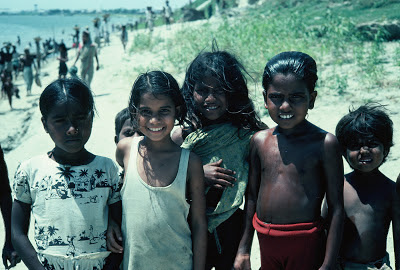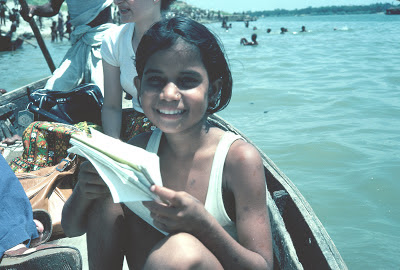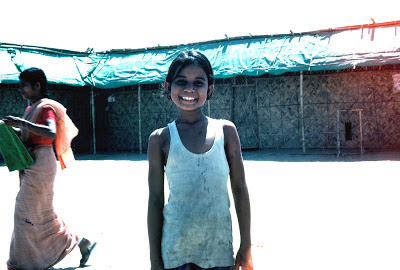(For the full story read The Gainesville Years, 1 through 13)
A busy life and a new book have made it difficult for me to keep up this blog, something I intend to do more faithfully in the coming year. In order to start out fresh, I need to close my Gainesville years, which ended up being primarily about my job in Bangladesh. Once I opened the gate to those memories, the stories poured out. They were so rich I couldn’t seem to close that chapter. But, it is time. Yet I cannot leave Bangladesh without sharing one more memory; one that, even after all these years, is still fresh in my mind. I met a young girl on that trip who touched my heart so deeply I went so far as to speak to Doctor Coddington about the possibility of adopting her.
I can still see her face in my mind’s eye; especially her ever- smiling eyes. Unfortunately, after all these years, no matter how hard I try I cannot seem to recall her name. It remains hidden somewhere in my memory, irretrievable. I will call her Amodita, which means “happiness” in Bengali, for she was truly the happiest child I have ever known. She grew up in abject poverty, yet she was filled with joy, and her curiosity—about all things—was insatiable. Language was no barrier. She always managed to make herself understood, and to understand.
Amodita appeared with some other children our very first day in her village. The others soon lost interest, but not her. She became our shadow. When it came time for us to go, I had become so attached to her that I found it difficult to leave her behind. All I could think of was what a waste her life would be trapped in this poverty, with no chance to get the education that would enable her to blossom.
I became obsessed with the idea of trying to adopt her. But Dr. Coddington, ever the wise soul, made me see that, while well intended, doing this would be an act of selfishness. I had not, he pointed out, given any thought to what impact removing Amodita from her community would have on her. She was bright, yes. But had I considered how traumatic it would be for her to be removed from all she was familiar with and plopped down in the United States, among people who would see her as a foreigner…whose customs and language and values differed so drastically from hers? And had I thought about what her loss would mean to her family? The qualities I saw in Amodita that made me want to rescue her were the very qualities that would enable her to help her family survive, and perhaps even thrive in her native culture.
He made his point. I didn’t pursue the idea any further.
And now:, meet Amodita
 |
| Amodita, second from left, with welcoming committee. |
 |
| Amodita and her radiant smile. |
 |
| Amodita's energy and enthusiasm were contagious. You could not look at her without smiling. |
 |
| Amodta was always filled with questions for Fran and me. |
I often think of Amodita and her joyful smile and quick mind and wonder where she is today. She was just a couple years younger than my daughter, so she would be in her late forties. I wonder how her life turned out. Was she able to help her family to a better life? Did she get a chance to get an education? Did she marry? Have children? I also cannot help but wonder what would have happened if I had not let Dr. Coddington dissuade me and had been able to adopt her. How would that have changed the course of her life?
One thing I do know. She taught me about happiness--that it doesn't depend on what one has, but on how one chooses to embrace life. Thank you Amodita.
I made one stop on my way home. Next, the final post of my Gainesville Years: A dream fulfilled.


